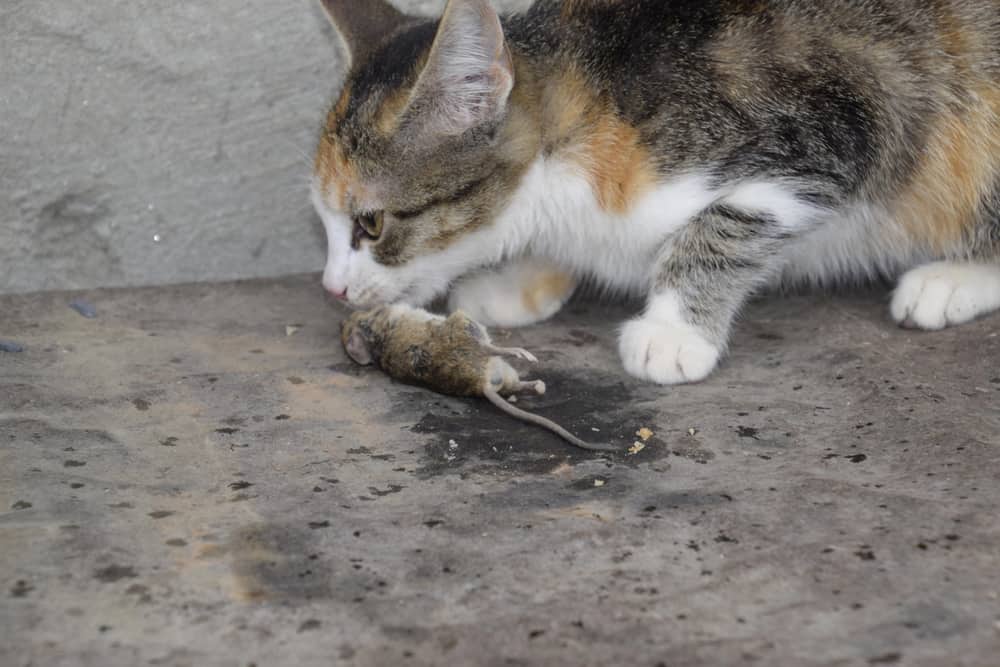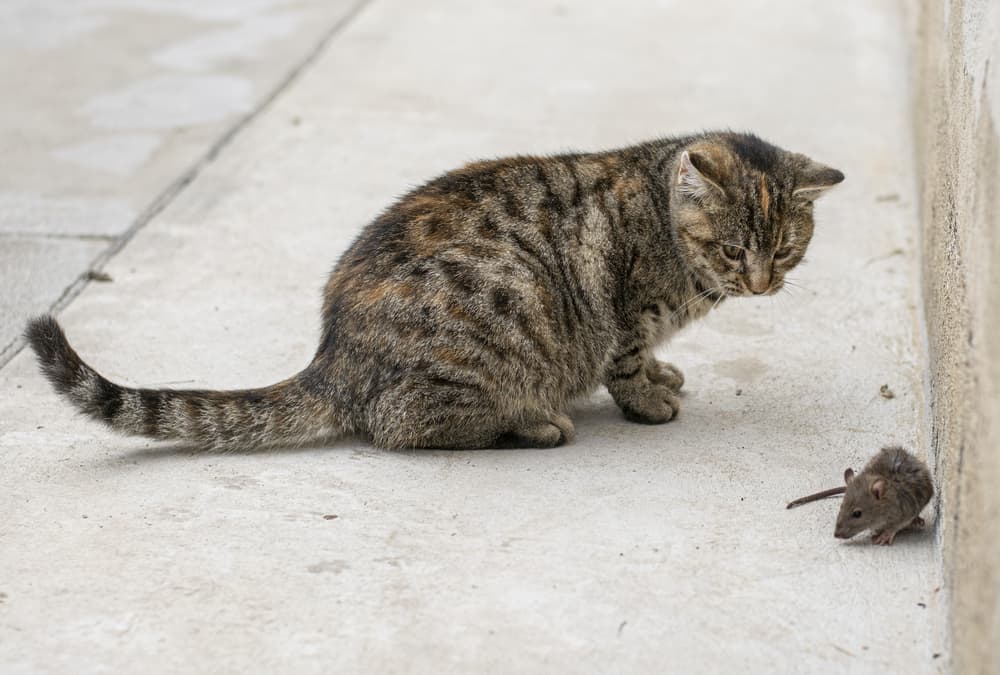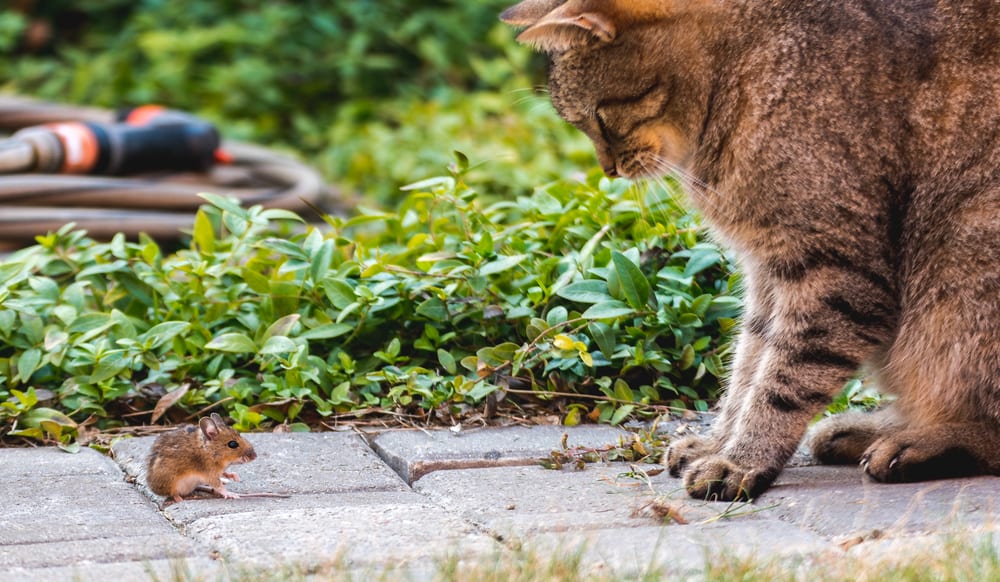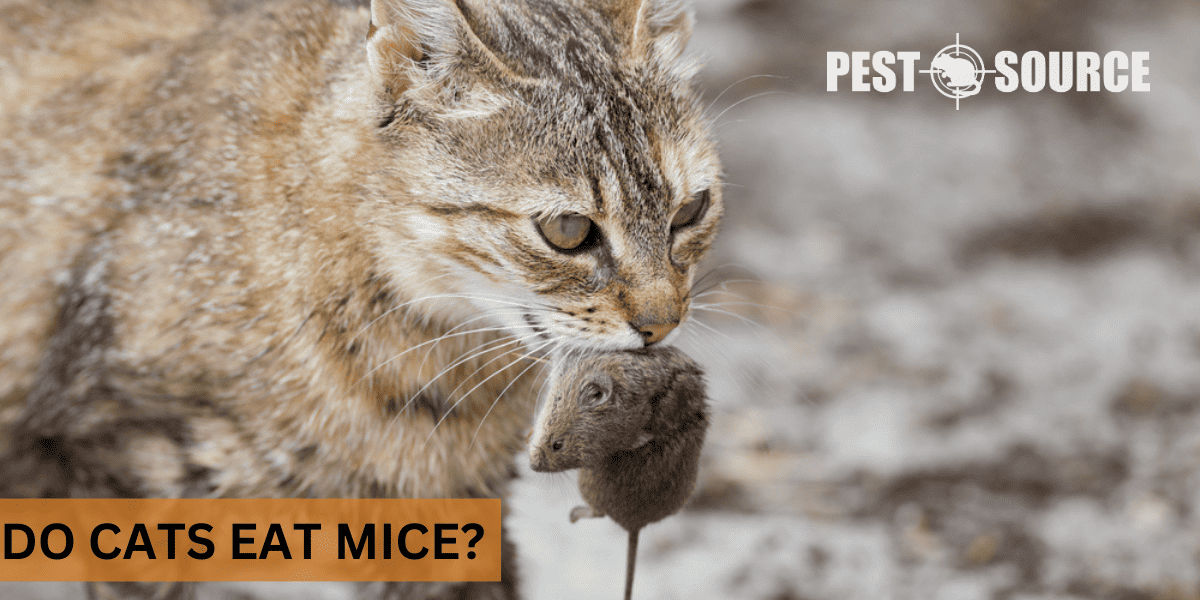Cats often hunt and eat mice, a natural behavior stemming from their predatory instincts. This article explores the role of cats in controlling mouse populations and whether they are a reliable method for managing these pests in domestic settings.
POINTS
- Cats have a natural instinct to hunt, inspired by their wild ancestors. They hunt and kill small mammals such as mice and rats, not just out of hunger, but also for the thrill of the chase.
- While cats can gain nutritional benefits from consuming mice, there are also risks attached. Mice can carry several diseases and parasites that can be harmful to cats, as well as physical risks such as choking or poisoning if the mouse previously ingested poison.
- If a cat presents its owner with its kill, it is a sign of respect, trust and familial bonding. The cat might be attempting to share the successful hunt with the owner or even teach them hunting skills.
- To mitigate hunting behavior in cats, there are several strategies owners can adopt. These include feeding small meals throughout the day, providing stimulating toys and a rich environment and attaching a bell to a cat’s collar.
- While cats can contribute to controlling smaller rodent populations, they should not be the only strategy for pest control, especially in cases of severe infestations. It is better to use conventional methods of pest control and preventive measures alongside keeping a cat.
What is the Predatory Instinct of Cats?
Do cats eat mice?

Absolutely. Cats have an instinctual urge to hunt, and this often leads to them capturing, killing, and consuming small creatures such as mice. These behaviors aren’t solely driven by hunger. Rather, the thrill of the chase and the ecstasy of the capture may motivate your cat even more. Eating a mouse is simply the natural end to a successful hunt.
Do cats eat rats?
Just like with mice, if your cat comes across a rat, their hunting instincts are likely to kick in. However, eating a rat is a slightly trickier question. The significantly larger size of a rat compared to a mouse can act as a deterrent for some cats.
Why are cats natural hunters?
Cats are perfectly designed for hunting. Equipped with stealth, agility, sharp claws, and vision adapted to low light, cats are capable of taking down prey larger than mice. This behavior can be traced back to their wild counterparts. Wildcats survive by hunting, and this instinct remains with our domestic felines, despite their comfortable lifestyle and readily available food.
How has this hunting behavior been observed in both domestic cats and their wild relatives?

Whether it’s a tiger stalking prey in the jungle or your house cat pouncing on a play mouse, the biological instincts of a cat are clear to see. Cats are hunters at heart. Be it domesticated or wild, their behavior mirrors each other when it comes to the thrill of the chase and delight in the catch.
In what ways do domesticated cats differ from wild cats in terms of hunting and eating mice?
Wild cats are often hunting to meet their dietary needs, whereas domesticated cats are usually well-fed and their hunting serves to satisfy more instinctual desires. That being said, domesticated cats can still be tempted to eat their catch, although this is less common when compared to their wild counterparts.
Do Cats Consume Their Prey?
How do cats kill mice?
For a cat, killing a mouse is quite strategic. First, they use their acute hearing and excellent nighttime vision to detect and track down the mouse. Once the mouse is within range, a cat will crouch down and pounce, capturing the mouse using their sharp claws and strong jaws to deliver a killing bite, typically at the back of the neck.
What happens when domestic cats catch mice?
Once a mouse is captured and killed by domestic cats, one of three things typically happens. They might eat it right away, especially if they’re hungry. Second, they might want to play with it, mutilating the captured mouse in what can seem like a cruel game. Lastly, they may choose to bring their prized capture back to you as a gift, demonstrating their hunting prowess.
Do cats eat mice or just kill them?
While cats do often kill mice, they don’t always eat them. Despite being well-fed by their owners, cats will pounce on and kill mice due to their predatory instincts. They derive satisfaction from the hunt and capture, making mice a perfect plaything. However, if they’re particularly hungry or in need of dietary supplements not found in cat food, they may consume their catch.
Do cats eat rats or just kill them?
The larger size and stronger defenses of rats compared to mice make them less appealing as a meal for cats. While hunting instincts might drive a cat to kill a rat, they generally do not consume the rat afterward. The act of hunting and capturing the rat is satisfying enough.
Do cats like rats?
Cats are certainly attracted to the chase and capture, but they don’t exactly “like” rats. In fact, rats can pose quite a danger to cats. While cats may enjoy the challenge of hunting these larger rodents, they don’t prefer rats as food, especially when there are smaller, easier prey available.
Do All Cats Eat Mice They Catch?
Do domestic cats always eat mice?
Not all domestic cats eat the mice they catch. Some cats, especially well-fed pets, might simply play with their prey or present it to their owner rather than eating it.
Why do some domestic cats not consume their prey?

A domestic cat’s decision to consume their prey can depend on a few factors such as their upbringing, current dietary state, and individual personality. A cat that grew up in the wild before being brought into a domesticated environment might be more inclined to eat its prey. Conversely, a cat bred and raised in a household might be more likely to show their catch rather than consume it due to their nutritional needs being catered to by commercial cat food.
What factors influence whether a cat eats its catch or not?

Factors such as the cat’s upbringing, current diet, and the size of the prey influence whether a cat eats its catch.
- Upbringing: An indoor cat that’s adequately fed may not see the need to eat its prey, while a stray or outdoor cat that needs additional nutrition may opt to consume it.
- Current Diet: Well-fed household cats may not feel the need to supplement their diet with prey.
- Size, taste, and safety of the prey: These greatly impact the cat’s decision. For instance, a small, non-threatening mouse might be consumed, while a larger, dangerous rat might just be killed and left uneaten.
Why Do Cats Present Their Catch to Humans?
What does it mean when your cat brings you a dead mouse?
No, your cat is not going for the shock factor. When your furry friend brings you a dead mouse, this is a sign of respect and trust. In their feline mind, they want to share their successful hunt with you – a way of providing for you. It may even be an attempt to teach you how to hunt, a life-essential skill in their eyes.
How is this behavior rooted in the wild instincts of mother cats?
In the wild, mother cats present their kill to their kittens. They do this to feed them and to teach them essential hunting techniques for survival. Your domesticated cat might be displaying this same maternal instinct towards you. In simple terms, it’s the ultimate feline compliment – your cat considers you part of their family.
How should owners interpret and respond to such gestures?
Although it may seem gross to find a dead mouse on your doorstep, remember that this is a gift from your feline friend. They merely want to share their successful hunt with you. Instead of reacting negatively, try to praise them for their hard work and dispose of the dead mouse when they’re not watching. This way, you’ll avoid hurting your cat’s feelings.
How Do Cats Consume Mice?
How do cats eat mice?
Domestic and wild cats alike show similar predatory patterns when it comes to eating mice. They typically start from the head and work their way down. This might seem gruesome, but for a cat, it’s a natural part of the eating process—a link to their life in the wild.
What parts of a mouse do cats typically eat and why?
Cats usually start with the head of a mouse, seen as a treat rich in proteins. If they are still hungry after that, they might consume the rest of the body, leaving behind only a few parts like the stomach, due to its unpleasant taste, and the tail.
Are there parts of a mouse that cats avoid?
Cats typically avoid the stomach of a mouse and the tail. The stomach is filled with acids and contents that could taste unpleasant for your cat, while the tail being sans nutrition is not worth the effort.
How do nutritional aspects play a role in cats’ consumption choices?
Cats have evolved as a strict carnivore, which means their bodies lack certain enzymes for digesting plant matter. As obligate carnivores, they need taurine—an amino acid present in meat—to survive. Mice are a rich source of taurine, which can make them an attractive food source in addition to cat food if dietary total amounts aren’t being met.
How does the consumption process differ when cats encounter rats?
Due to their size and aggressive nature when cornered, rats might not always end up being consumed by cats. Cats might kill rats as a result of their hunting instincts, but their larger size and potential risk of injury make the cat likely to leave the rat uneaten after the kill.
How Often Will Cats Hunt and Eat Mice?
What’s the average number of mice a feral cat might eat in a day?
In the wild, cats feed primarily on small mammals such as rodents and birds. Feral cats have been found to consume as many as nine mice per day. This frequent hunting helps to meet the feline’s dietary needs and utilizes their innate hunting skills.
How many mice will a domesticated cat eat in a day?
A household cat will generally kill fewer mice simply because they usually have fewer opportunities to do so. If your cat does catch a mouse, they’re more likely to play with it, present it to you or leave it uneaten rather than consume it—especially if they are regularly fed a balanced diet of cat food.
How does the hunting frequency and diet of feral cats compare to domesticated cats?
Feral and domesticated cats display similar hunting behaviors, but the frequency and outcome of the hunting significantly vary. Feral cats are reliant on hunting for survival and therefore hunt more often and consume more of their prey than domesticated cats.
Domestic cats, on the other hand, having their nutritional needs met regularly, tend to hunt less often and mostly for sport, often leaving the prey uneaten.
What are the Nutritional Benefits and Risks of Cats Eating Mice?
From a nutritional perspective, there are benefits to cats eating mice. However, the risks involved often outweigh these benefits.
Are there nutritional benefits for cats in consuming mice?
Mice offer a high-protein, nutrient-rich meal for cats. They contain meat, bones, and organs that are suitable for your cat’s dietary needs. Consuming mice also allows your cat to ingest water, as mice, like most prey, are high in moisture content.
Can eating mice harm cats?
While the act of hunting and eating mice can be seen as a natural, primal activity for cats, it’s not without risks. Mice can carry diseases and parasites that represent health risks for cats.
What potential diseases might mice carry that can affect cats?
Mice can carry a range of diseases that can be transmitted to cats, including toxoplasmosis, salmonella, and various parasites such as ticks, lice, mites, and roundworms.
How do symptoms manifest if a cat contracts a disease from eating a mouse?
Noticeable symptoms in your cat after consuming an infested mouse could include:
- Fever: If your cat starts showing signs of a sudden high fever, it could be due to a disease contraction from the mouse.
- Loss of appetite: Mice-borne diseases often cause cats to lose their appetite.
- Weight loss: A sudden decrease in weight could indicate that your cat is battling with internal issues, perhaps from a mouse-related disease.
- Lethargy: Your usually active feline friend suddenly becoming lazy and less active might indicate a health problem.
- Pneumonia: Although rare, cats can contract pneumonia, a serious condition, from infected prey.
- Inflammatory eye problems: Constant inflammation of the eyes after your cat has consumed a mouse could be a sign of disease.
What are the physical dangers associated with eating mice?
Aside from diseases and parasites, there are physical dangers too. Small bones can pose a choking hazard or may puncture your cat’s digestive tract. If a mouse has ingested poison before being caught, it could potentially harm or even kill your cat.
What To Do If Your Cat Eats A Mouse?
What immediate steps should you take if your cat eats a mouse?
If you notice your cat has consumed a mouse:
- Don’t panic. Remember, it’s a natural instinct for them.
- Monitor your cat closely for any signs of illness such as lack of appetite, unusual lethargy, or any signs of discomfort.
- If you know the mouse might have been poisoned (for instance, if poison is used in your home or area for rodent control), call your vet immediately.
What are the signs that your cat might be unwell after eating a mouse?
Signs that your cat might be unwell could include vomiting, lethargy, loss of appetite, or diarrhea. If these symptoms persist, it’s crucial to consult a vet without delay.
How can you safely dispose of a mouse your cat has killed?
When you need to dispose of a mouse that your cat has killed, follow these steps for safe and effective disposal:
- Separate the Cat and Mouse: Ensure the cat is in a separate room and can’t see you dispose of the mouse. Cats can become protective of their catch and may try to reclaim it causing unnecessary stress and potential injury.
- Protection: Put on a pair of gloves or invert a plastic bag over your hand. This step is important to avoid direct contact with the dead mouse, which might carry diseases or parasites.
- Disposal: Carefully pick up the mouse and put it inside a plastic bag. Ensure that the bag is sealed properly. Then, place this bag into the trash.
- Cleanup: If the mouse was found inside your house or any other area that humans or pets frequently come into contact with, make sure to disinfect the area thoroughly after disposing of the mouse. This can help to prevent the spread of any potential diseases. Over-the-counter disinfectants or bleach solution can be used for this purpose.
When should you consult a vet after your cat has consumed a mouse?
If you notice any changes in your cat’s behavior, appearance, or bowel movements, consult your vet. Even if it seems minor, it’s better to be proactive and ensure your kitty’s health isn’t at risk. And if you have any doubt, don’t wait – get your cat help right away.
What Are the Effective Strategies to Reduce Cat’s Hunting Behavior?
While hunting is a natural behavior for cats, there are certain strategies you can adopt to reduce their hunting impulse, especially if it causes issues in your household.
- Bell on Collar: A simple, but effective measure is to put a bell on your cat’s collar. This can warn potential prey of your cat’s approach, making it difficult for them to sneak up on mice and other small animals.
- Feeding Schedule: Feed your cat small meals throughout the day. This can help fulfill their instinct to hunt and kill multiple smaller ‘meals,’ reducing the need to hunt.
- Engage in Play: Physical play satisfies your cat’s hunting instincts. Stimulating toys, like feathers on a string or laser pointers, can effectively engage your cat in a ‘hunt.’
- Environmental Enrichment: Make sure your cat has access to a rich, stimulating environment. A boring environment may encourage hunting behaviors out of a need for stimulation.
- Spay/Neuter: If your cat isn’t already spayed or neutered, considering this procedure could potentially reduce their need to hunt.
- Prevent mice from coming near your house: This indirectly reduces the opportunity for your cat to hunt.
Remember, these strategies may not completely stop your cat from hunting, but they can significantly reduce the frequency of such behaviors.
Are Cats Effective for Pest Control?
Whether you love it, hate it, or find it fascinating, cats can be excellent for pest control.
How have cats historically helped humans in controlling pest populations?
Historically, cats have provided invaluable services in pest control. Long before they curled up on our couches, early domesticated cats earned their keep by catching and killing rodents, thus protecting precious food stores from infestations.
Can and should you rely solely on cats for controlling mice and rat infestations?
While cats can offer assistance in controlling smaller rodent populations, they should not be your only plan for pest control, particularly in cases of severe infestations. Mice breed very quickly, and a cat can only catch so many mice in a day.
Additionally, remember that mice carry diseases that can be passed to cats. Always make sure your cat’s vaccinations and worming treatments are up to date. For significant infestations, it is still best to call a professional pest control service.
What are the best methods to use alongside cats for pest control?
In addition to having a cat, it is advisable to use more conventional methods of pest control such as traps, rodenticides, and professional pest control services. Also, preventive measures like sealing gaps in your home, proper sanitation, and using garbage bins with tight-fitting lids can help keep rodents away.
Which Cat Breeds are Natural Hunters?
All cats have the instinct to hunt, but certain breeds are renowned for their superior hunting skills. These include breeds such as the:
- American Shorthair
- Maine Coon
- Siberian
- Siamese
- Chartreux
- Burmese
- Manx
- Turkish Angora
- Japanese Bobtail
- Persian
But ultimately, the individual cat’s upbringing, personality, and experiences play a significant role in determining its hunting abilities. Remember, even the best mouser amongst cat breeds can be a gentle lap cat with a lazy streak if raised in an environment without the need to hunt.
The Complex Relationship Between Cats and Mice
The relationship between cats and mice is a complex one. While it’s primarily shaped by the cat’s natural instincts to hunt, it’s also influenced by factors such as the cat’s environment, diet, and the individual traits of the cat.
Do cats really eat mice, or is it more about the hunt?
Yes, cats do eat mice, but the inclination to do so varies greatly. For some cats, the thrill of the hunt might be the most satisfying aspect, leading them to kill mice without necessarily eating them. Meanwhile, others may hunt and kill small rodents to supplement their diet or engage their instincts.
What precautions should cat owners take if their pets are prone to hunting and consuming rodents?
For cat owners whose pets have a penchant for hunting and consuming rodents, it’s essential to monitor their cats closely for any signs of illness. Make sure your pet is up to date on their vaccinations, and consider regular deworming as a protective measure. If you see your cat eating a mouse, observe them closely over the next couple of days, and consult your vet if you notice any changes or odd behavior.



